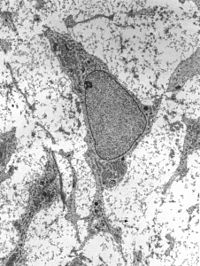
Photo from wikipedia
Objectives Inflammation plays a key role in the pathogenesis of atherosclerosis. Piper sarmentosum is an herb with antioxidant and anti-atherosclerotic activities. The aim of this study was to evaluate the… Click to show full abstract
Objectives Inflammation plays a key role in the pathogenesis of atherosclerosis. Piper sarmentosum is an herb with antioxidant and anti-atherosclerotic activities. The aim of this study was to evaluate the anti-inflammatory properties of an aqueous extract of P. sarmentosum (AEPS) in human umbilical vein endothelial cells (HUVECs). Methods HUVECs were divided into six groups: control, treatment with 10 ng/ml TNF-α, and co-treatment of 10 ng/ml TNF-α with four different concentrations of AEPS (100, 150, 250, and 300 μg/ml) for 24 h. Subsequently, vascular cell adhesion molecule-1 (VCAM-1) and intercellular adhesion molecule-1 (ICAM-1) protein expression, U937 monocyte cells adhesion, and nuclear factor-kappaB (NF-κB) p65 expression in HUVECs were measured. Results Treatment of TNF-α-stimulated HUVECs with AEPS at different concentrations resulted in decreased VCAM-1 and ICAM-1 protein expression in a dose-dependent manner. Furthermore, AEPS also inhibited TNF-α-stimulated U937 monocyte cells adhesion to HUVECs. In addition, AEPS reduced TNF-α-induced NF-κB p65 expression in a dose-dependent manner. Conclusions The results indicated that AEPS suppressed TNF-α-induced VCAM-1 and ICAM-1 expression NF-κB signaling.
Journal Title: Journal of Taibah University Medical Sciences
Year Published: 2018
Link to full text (if available)
Share on Social Media: Sign Up to like & get
recommendations!